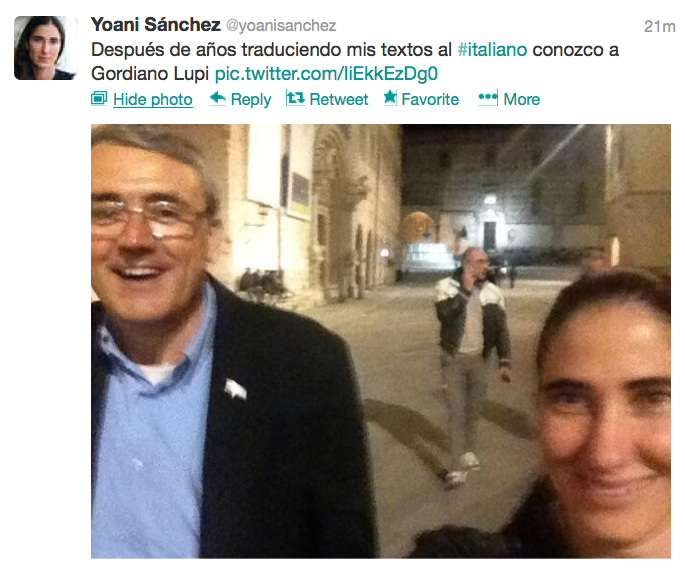
28 April 2013
English Translations of Cubans Writing From the Island
 On Thursday night I was watching a program of Latino film that the TV on my planet aired. I never watch it, because of the poor quality of most of the movies and topics chosen, but this one interested me. I was amazed that they showed the Chilean film “NO” on a medium as important as this. This movie was seen on the big screen in one of the recent festivals, but that was barely any exposure. In the movie it shows how a pragmatic dictator, Pinochet, agreed to face a plebiscite on his continuation in power, and even more astonishing, that he acted in conformance with the popular vote.
On Thursday night I was watching a program of Latino film that the TV on my planet aired. I never watch it, because of the poor quality of most of the movies and topics chosen, but this one interested me. I was amazed that they showed the Chilean film “NO” on a medium as important as this. This movie was seen on the big screen in one of the recent festivals, but that was barely any exposure. In the movie it shows how a pragmatic dictator, Pinochet, agreed to face a plebiscite on his continuation in power, and even more astonishing, that he acted in conformance with the popular vote.
It was very interesting to be able to see how they undertook the NO advertising campaign despite attacks from the right. What was smart about the campaign was the making of the advertising “spots” advocating for future and optimistic Chile, without wallowing in the tragic events that followed the military coup, even against opinions of some of the participants of this campaign. They presented the “No” campaign with intelligence and freshness and finally managed to convince the majority.
Another detail that caught my eye was being able to hear throughout the shooting of the film that both proposals, the YES and NO, were granted the same amount of minutes in television space. Something that stands out when we just observed the media manipulation and centralization of Chavismo in Venezuela in the recent election campaign and subsequent voting, not to mention the denial of the opposition’s request for a recount of 100%.
I believe that despite taking into account, and never forgetting that it was Pinochet and the harm he did to his opponents, we have to recognize that in the end, the dictator obeyed the will expressed in the NO of the Chilean people. I think this is a fact to consider.
Sometimes on television in our country, which is characterized by an ideological monopoly, or “it’s in the details,” or simply someone wishes to escape it.I would greatly like them to continue showing films like this one, which show the two sides of the same coin. In my humble opinion it takes the same courage to say NO as to act on it.
28 April 2013
Six Cuban poets in Miami gathered under the banner of Disobedient Poetry to read their poems on the night of April 25.
Jorge Valls was once again the child who retraced the plains of his country and remembered his mother, along with poetry to return to the fact of being a man who lives his life through his writing. Angel Cuadra took himself to the fateful day in the ’80s in Cuba, when the Acts of Repudiation initiated an era of pain and hatred.
Also there were Manuel Vázquez Portal, Regis Iglesias, Janissete Rivero and Luis Felipe Rojas. Poets who have used their words to point to the misfortune of their country, but who also walk the paths of love, friendship and the human touch with the lyric as a flag to describe their lives and those of others. A poetry that is committed to human pain and the joy of life after having gone through the bars of a cell, the final separation from family and friends, and the temporary loss of one’s native earth. A poem that travels from pain to the will to live.
The evening event had as its central focus poets who have gone through prison, persecution and public scorn and have not stopped writing poetry for themselves and for current generations. Valls and Cuadra passed through long and difficult years of imprisonment,and the unjust sentences they were subjected to and have not dampened the spirit of the lyrics of Vázquez Portal and Regis Iglesias and their public reading showed how much effort it takes to overcome the false ordinances.
The Ivan Galindo Workshop-Gallery opened Friday night to show another side of literature in Miami, with the strength of cultural environment we breathe today.
The expectant crowd cheered the “Disobedient Poetry” written by the former long-standing political prisoners and social activists who have survived those who persecute and try to kill them, through the force of totalitarian decrees.
26 April 2013
This article is from PenultimosDias.com
Vanitas: Still Alive is a guerrilla projection by Cuban-American artist Geandy Pavón. This particular piece is part of a series of street interventions in which the artist for a short period of time transforms a particular place into something completely different from its original state. Even thought this piece stand by itself, it can be considered a sequence of his previous “Nemesis” project:
What is a Vanitas?
Vanitas (Latin, “vanity” ) in art, is a genre of still-life painting that flourished in the Netherlands in the early 17th century. A vanitas painting contains collections of objects symbolic of the inevitability of death and the transience and vanity of earthly achievements and pleasures; it exhorts the viewer to consider mortality and to repent. The vanitas evolved from simple pictures of skulls and other symbols of death and transience frequently painted on the reverse sides of portraits during the late Renaissance. It had acquired an independent status by c. 1550, and by 1620, it had become a popular genre.
The Projection
The projection consists of a video in which an 11-year-old boy, points a pistol at his head. The place chosen for the projection is Times Square at nighttime, in front of a famous toy store, using the main wall of a theater, located on 44th Street and 7th Avenue. The child is Daniel Foxx, a child actor living in Los Angeles.
In the context of the city, the use of this image would function in the same way that the skull functioned in a baroque painting. Times Square, a place of artifice and mercantile excess, brings the concept of the baroque to the world stage. In the middle of this carnival-like atmosphere, the giant image of a suicidal child will appear, as if to remind us that behind the masquerade, there is another reality, that of death and uncertainty. “Vanitas” is a work that proposes to get to the core of this idea, to the skull, to the essence in which things seem to relinquish their skin to show themselves in their truest state. This reality, this naked bone, will acquire a real sense in the midst of the carnival, the festival of flesh that is Times Square.
This work is inspired by the current debate on the possession of firearms and the growing symptoms of violence in North America.
For more information please contact the artist at: geandy.pavon@gmail.com
Tel.: (201) 289-2843
Note from Translating Cuba: Geandy Pavon’s well know for his “Nemesis” project which projects the faces of Cubans who have been assassinate by the government on the facades of buildings occupied by the Cuban government abroad. Translating Cuba is proud to be a small part of bringing Geandy’s work to a wider public.
28 April 2013
 For some time, our main political leaders have begun talking about the need to accept and respect differences, both in Cuban society and the world. Although, in regard to the world, at least in the speeches and communications, and even some regional and international organizations. In the national sphere it’s not the same and they limit themselves, so far, to questions relating to culture, religion, race and sexuality. The issue of differences in political conceptions seems to be taboo, and not part of the official language.
For some time, our main political leaders have begun talking about the need to accept and respect differences, both in Cuban society and the world. Although, in regard to the world, at least in the speeches and communications, and even some regional and international organizations. In the national sphere it’s not the same and they limit themselves, so far, to questions relating to culture, religion, race and sexuality. The issue of differences in political conceptions seems to be taboo, and not part of the official language.
To accept and respect some differences, excluding other important one, is not serious nor sufficient: acceptance and respect should encompass everything but, even more, it is essential to create the constitutional and legal framework to ensure their practical implementation, and failing this it is all just words which, usually, are gone with the wind.
“Pluralism,: which is a more all-encompassing than “differences,” is a pending issue for the authorities, to which they have to pay special attention, if they truly want to walk the path of economic reform, although they want to call it an “update” when what it needs is to be “fixed.”
Without constitutional and legal changes that delete or modify the different articles that prevent and repress pluralism, our society cannot advance and, much less, get in line with the times. To keep one-party hegemony, political and social organizations organized and controlled by it, a National Assembly legislates and, itself, decides the constitutionality of legislation (judge and jury) and elects the president and fills the main posts, based on a proposals from a so-called Nominations Commission, without direct participation of voters and other absurdities, refusing the proclaimed acceptance of differences, or, and it’s the same thing, of pluralism.
It’s true that this is not an easy task, for those who have held absolute power for more than fifty years, but, sooner rather than later, they will have to decide to take the bull by the horns, for the good of the nation and of all Cubans.
23 April 2013
Last Thursday I was in Havana without leaving Madrid. Thanks to the guitar of Boris Larramendi I took a little hop to the Island. A brief but intense return, on the wings of chords and a good musician. At a place in the Spanish capital we found a group of friends, some graduates from the Faculty of Arts and letters, but also former players in whatever musical groups existed in Cuba in the ‘90s. I felt at home, because right in the living room of our apartment we had one of these gatherings that we recalled the night before last. We remembered the lemon grass tea with a little sugar with which we restored our energy after carrying our bikes up 14 flights of stairs. But mostly, we recollected the good songs we had heard there, the space for freedom that we managed to create for at least a few hours.
Beyond the choruses and the rice with beans, I particularly enjoyed the reunion with my compatriots. Many of them are still trying to find their way in a Spain hit by the economic crisis and political questions. Some are unemployed, others illegal, several with children born here who don’t know the country of their parents; all aware of what is happening in Cuba. Boris sang himself hoarse, and we clapped along until our palms were red and, already past midnight, humor took over and we reveled in jokes.
On one wall a TV showed images recorded on the streets of Havana. The Malecón and the corner of 23rd and L were a visual background accompanying our improvised “Guaracha” around two tables. At one point I realized that the recording that was passing across the screen was from a police security camera. But here this filtered surveillance material was just an amusing video in a space for entertainment. The official eye become banal; control converted into a frivolous daily report. But not even that could distract us from the most important thing happening in that room: the confluence. We were finding a point in common after a long journey and prolonged separation. We were more free than at any gathering in Havana and yet, we were still the fruit of all those Havana gatherings. A blessed past that we have waited for this morning.
27 April 2013
By Ignacio Estrada
Havana, Cuba – In recent days, correspondents from Cuban television and newspaper correspondents from accredited foreign media in the capital undertook an unusual journey through different prisons.
The reporting reflects only what the Cuban government wants to show the world in the face of their constant refusal to let the United Nations Special Rapporteur for Human Rights into the country, along with international officials of other agencies such as the Red Cross.
The deterioration of the Cuban prison system and the constant violations of inmate rights is reported by alternative media that exists on the island, denunciations that are narrated via telephone in often broken voices, people sobbing to themselves and another large number of their families and a smaller number through third parties.
Cuba is the Latin American nation with more prisons and a prison population mostly young, for crimes that include prison sentences just for eating beef.
If the accredited media want to talk about the island prison system they would have to take as a reference the countless testimonies of the many people graduate from prison and now despite being released can not get their jobs back. Or better still to describe each of the punishment cells in which many have tried to to end their lives out of despair and others have lost their lives in some cases in unknown situations.
Those who have been in prison fall into things like this, they become accomplices of those who often repeat intimidating phrases like this: The Cockroach when he’s in the hen’s beak doesn’t make demands! A speech about explaining to the accused that they are trapped by the prison system.
A question to ask the National Bureau of Prisons is what is the annual number of self-attacks in prisons, a number that will never be revealed because it would show the mental imbalance and fears in a figure that is constantly growing. When we touch this issue we are not referring to something unknown, we are talking about a reality and that is the reason that hundreds of prisoners are admitted to hospitals each year and in most cases require surgery.
The self-attacks are described derisively by the jailers themselves unscrupulously labeling those who opt for this kind of protest of the system as “Tragics,” cutting their veins, swallowing barbed wires, sticking pins in their eyes, burning and mutilating parts of their bodies, injecting feces and urine into their legs and even voluntarily injecting themselves with HIV/AIDS; these are all some of the ways in which the Cuban prison population constantly attacks their own lives.
I respect each colleague of both the domestic and foreign press but there are things that piss me off and make me lose my faith at times in the work they do. Is it perhaps that Raul Castro and even the brand new Cuban vice president, are not calling on the press to be objective and fill the role of true communicators or the Cuban reality? Lying is the same thing they did in ’fifty-nine. Everything continues to be a false government disguised by a puppet press.
I promise in a second paper to describe the Cuban jails where prisoners with HIV/AIDS serve their sentences. Prisons that now total six which together have an inmate population that excludes 500 inmates.
22 April 2013
I confess that I, like many, was surprised how hard-fought the fight was. Fewer than 300,000 votes difference, and both candidates with more than 7 million votes, is virtually a dead heat that calls for a deep reflection: how is it possible that after all these missions implemented by the Government of Hugo Chavez even half of Venezuelans voted for the alternative, Capriles? Could Venezuelans be so ungrateful? Or is what is hidden behind this shift a part of history that always escapes whenever you look through a single prism?
As I said in my second to last post, almost every reference on the subject has brought me colleagues who are returning from Venezuela, workers who left under conditions that I refrain from judging so as not to stoke the demons. But the truth is that now we get indisputable evidence: half of the electorate voted for the project that advocates reversing more than a decade of Bolivarian Revolution and choosing to return to the previous scheme.
I know well, from my own experience, that the ocean waves tend to distort the reality emitted by the antennas; so it is that hundreds of millions of earthlings still have a distorted sense of the Cuban reality, for example, and by analogy the same thing could happen in this case.
I speculate on the possibility that behind Hugo Chavez’s discourse, however sincere, is sheltering this opportunistic element that never fails in these situations: a whole caste of officials who in the name of the movement have filled their pockets and positioning themselves just to see how much they can benefit themselves, something that could be seen every day by this whole mass of people who voted on both sides, and that is not transmitted, presumably, on Telesur.
But personally, my sixth sense makes me doubt the alternative, Capriles; I simply do not see that he has the charisma to lead a nation. With the entire economic livelihood of the oligarchy there to count on for logistical support, I suspect that the money has been their only currency. It puts me in the dilemma of choosing, never having opted for someone so devoid of magnetism.
Although to offer an opinion from more than six hundred miles of stormy Caribbean away implies a margin for error, “especially when dealing with such complex realities,” this is something that I assume mine isn’t more than one opinion among millions.
I hope that whatever path this sister nation takes, whatever it is, includes the most absolute political and economic independence and the greatest justice and social inclusion possible, and that it all comes through paths of peace because it is this and no other dream that I desire for my own people. But as I see things now, the government of Nicolas Maduro will have to walk a very fine line if he wants to continue his ambitious social project, because it’s absolutely certain that, from inside and outside the country, powerful and dark shady deals are going to be working against him.
23 April 2013
 Two different audiovisual have made me reflect again on our country’s future. The first, a recent BBC report on North Korea. It is one thing to read about this dystopian society and another to view images whose referent is the Orwellian nightmare. Politics is complicated, but they can not be good. Knowing them to be friends of my government gives me a feeling similar to that produced in me by demonstrations of friendship with the Iranian government.
Two different audiovisual have made me reflect again on our country’s future. The first, a recent BBC report on North Korea. It is one thing to read about this dystopian society and another to view images whose referent is the Orwellian nightmare. Politics is complicated, but they can not be good. Knowing them to be friends of my government gives me a feeling similar to that produced in me by demonstrations of friendship with the Iranian government.
But to dispel that depressing vision, last night, in the Cinema of Our America, I saw “No,” the Chilean film about the referendum against Pinochet. The film left me feeling very positive that the opposition could act from joy, and so from that feeling can call people together.
Not to maintain the scheme that to dissent is dangerous, because people from instinct or fear shy away from dangerous situations, even when they can’t divine them, can’t divine the depletion of public confidence in the government.
From the confrontation and the pulse, the heroism is evident, but this in itself does not add up and often valuable and much-needed life. I’m thinking right now about the hunger strike of a large group of activists from UNPACU — the Patriotic Union of Cuba — which very few Cubans inside the island know about, but which is magnified in this rumor of repression to which they are subjected.
There are ideas that I share with you, readers, because you already know what the associations are. With all due respect for the pain of many families, the joy, that component of our character, should be a basic component in the mortar of our reinvention as citizens.
26 April 2013
By Ignacio Estrada
Havana, Cuba. While the Catholic Church stumbles before the growing number of child abuse scandals, the Cuban clergy seems immune to this epidemic.
The fact is that so far this Pandora’s Box has not been opened on the island. I don’t think that’s a reason to think that events like this could not have happened on our land. We would only have to dig and put our ears to the ground to hear the rumors of our grandmothers and grandfathers or even ourselves a little more what happens when we serve at mass.
With my note I don’t mean to accuse any priest or religious but if I pushed the drops would begin to fall. I am convinced that at some point someone started to talk and others thought about how, like in other countries, what the church can give in exchange for their silence.
That’s if the Cuban government, shrewd and cautious like always in its communications between church and state doesn’t think to collect evidence or those small and insignificant anomalies and ask for favors in return or better yet ask for the complicity of the Church and the Cuban Catholic hierarchy.
I know a large number of priests and religious of both sexes and I know some people like the opposite sex and some have occasional and spontaneous relationships but the largest number of these I know are gay.
As a Catholic, as a homosexual and as a Cuban I am going to be talking and this is the ground I stand on. I know cases like these exist and I simply try with my note to call attention to this abomination.
No matter what we are, nor the preferences we have, child abuse must end now. The Cuban and Universal Church should immediately receive an injection of renewal and delouse faults like these, that exonerate those who have not committed these offenses and sit on the bench next to those who have committed them but remain the silent.
I know that those who answer the call of vocation never cease to be men and women, I understand human matter and we are not ones to criticize. The fact that acts like these are committed should not because we, as the faithful, justify our one. On the contrary, we must fix on the true teaching of Jesus Christ.
To allow God that is really our Cuban church is far from any scandal like this. To allow God to enthrone the new Pope with the name of Francis I comes to repair our church and tidy up our home.
22 April 2013

From the site manager: Yusnaby tweeted today that he is again walking the streets… but that his cellphone has been completely erased (by the cops punching in too many wrong passwords)…
But… We have been unable to find any acquaintance in Havana who also knows Yusnaby, no one who can check on him, no photos of him other than the one on his blog, no phone number, no nada. (Does he exist?!)
Speak up, Yusnaby! Do you have a phone, a landline, an address, any place someone can meet you and make sure you’re ok? How about your Mom’s phone/address?
We are all anxious to hear from you. Proof of life, please!
Ian Vasquez interviews Cuban dissident blogger Yoani Sanchez on the future of Cuba. The interview occurred on 20 March 2013.
A video of the session with Ian Cato and Orlando Luis Pardo Lazo, with Ted Henken translating, from that day is available here.
Published by the Cato Insitute on Apr 25, 2013

Poster from http://www.juventudrebelde.cu/
The annual carrying on over the victory of Playa Giron (Bay of Pigs) happened this fourth month, with the national media playing it down. The elections in Venezuela were the priority of the Cuban government after the physical death of Hugo Chavez and it seems that a matter of so much preoccupation and occupation, a vital matter of political survival for them, that they quietly commemorated the victory gained April 15-19 of 1961 by the then young Revolution, against the invaders.
The remains of Sara Gonzalez* must have been spinning in the stinking waters of Havana Bay this month. Her iconic song “Giron, the Vanguard,” an allegory of that military success of the nascent Cuban dictatorship, wasn’t even heard as usual in the four days of the media hammering that usually accompanies the remembrance.
Sometimes it seems that the government thinks that we are a subnormal people or that we have learning difficulties, so they must repeat to us, over and over again, the events and dates and produce multiple TV and radio programs to repeat the events and dates over and over again and make many radio and television programs to plant the understanding in our minds over the entire year; but the more repetitions on the anniversaries. Perhaps others, like myself, noticed the government slip-up, but they chose to let us escape, although just this one time, from the persistent official harassment, the manipulation of consciousness that historically reigns over the minds of our subjected people. What a relief!
*Translator’s note: Sara Gonzalez Gomes (~1950-12012) was a Cuban singer songwriter who was part of the Nuevo Trova with figures such as Silvio Roriguez and Pablo Milanes.
25 April 2013